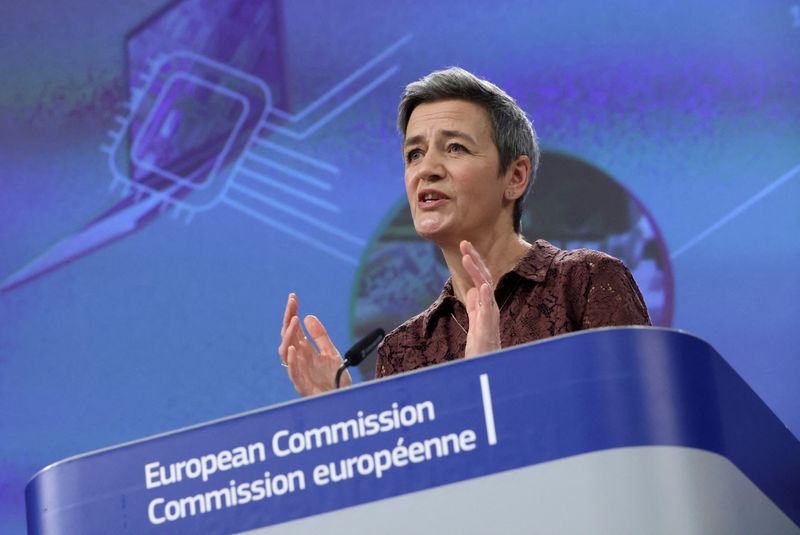By Foo Yun Chee
BRUSSELS (Reuters) - Landmark EU rules targeting Google, Amazon (NASDAQ:AMZN), Apple (NASDAQ:AAPL), Meta and Microsoft (NASDAQ:MSFT) are likely to set a global benchmark and may even force changes in the tech giants' business models, lawyers and experts said.
Europe's antitrust chief Margrethe Vestager won backing on Thursday from European Union members and EU lawmakers for her proposal, the Digital Markets Act (DMA), to rein in the powers of the tech giants via legislation for the first time, rather than lengthy antitrust investigations.
The DMA sets out a list of dos and don'ts targeting each tech giant's core business practices.
The legislation, which is expected to go into force in October, could bring sweeping changes to the global tech industry, upsetting profits and the dominance of the companies who built up huge businesses operating like walled gardens.
Google, a unit of Alphabet (NASDAQ:GOOGL), would be barred from unfairly ranking its own services above rivals under the DMA.
Apple, which warned about malware risks and cybercriminals hijacking its iPhone, may have to open up its App Store to allow customers install software from other apps or the internet.
It may face a similar requirement in its home market after a U.S. Senate panel last month voted to advance a bill that would force companies to allow people to load apps on their phones without using official app stores.
Facebook (NASDAQ:FB) would have to let WhatsApp users interact with others on rival messaging services, according to the DMA.
"DMA is here to stay and will be quickly mirrored in a number of countries. The flexibility that big tech had will be constrained, as the regulatory 'straitjacket' will get tighter globally," said Ioannis Kokkoris, competition law professor at Queen Mary University in London.
Vestager's switch to legislation came amid frustration over slow-moving antitrust investigations that deliver remedies criticised by rivals as inadequate. Google has often been cited as an example, with critics saying it has yet to show a significant change of approach despite being fined more than 8 billion euros ($8.8 billion) after a decade-long investigation.
The new rules include hefty fines between 10% to 20% of a company's annual global turnover, which could push tech giants to rethink their strategy on long-term goals and swap their business models for others.
PRESSURE
"If it succeeds, the DMA will put pressure on monopoly rents of gatekeepers in tipped markets, thereby encouraging them to move towards more long term innovation targets," said Nicolas Petit, professor of competition law at the European University Institute in Florence.
"I think the DMA indirectly places a premium on business models based on subscriptions or device level monetisation. We might see more (increased) prices, and vertical integration into hardware in the future," he said.
The DMA applies to gatekeepers with app stores, search engines, social networks, online ad services, cloud computing firms, web browsers and virtual assistants.
The big tech companies, with its army of lawyers, might also be able to find some wiggle room to dodge the full impact of the DMA, raising questions whether the Commission will have a big enough team to enforce the new rules.
"The Commission suggested upon proposing the DMA that it would be enforced by a team of 80 people," said Thomas Vinje, a partner at law firm Clifford Chance in Brussels who has advised rivals in cases against Microsoft, Google and Apple.
"This will not be enough to enable effective enforcement," he said.
Apple and Google have lobbied intensively against the DMA, saying it could create unnecessary privacy and security risks for their users and hold back innovation and lead to fewer consumer choices.
The DMA is just the first step towards making sure that tech giants play fair, said Alec Burnside, a partner at law firm Dechert in Brussels.

"The DMA is not a perfectly formed panacea from the start, and without doubt gatekeepers will try to navigate around it. Rome was not built in a day, nor was the highway code perfect when first conceived," he said.
($1 = 0.9093 euros)